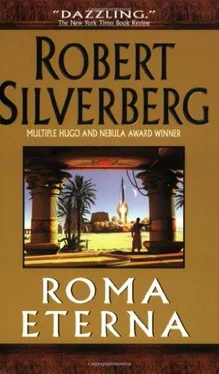Robert Silverberg - The Reign of Terror
Здесь есть возможность читать онлайн «Robert Silverberg - The Reign of Terror» весь текст электронной книги совершенно бесплатно (целиком полную версию без сокращений). В некоторых случаях можно слушать аудио, скачать через торрент в формате fb2 и присутствует краткое содержание. Год выпуска: 2003, ISBN: 2003, Издательство: HarperCollins, Жанр: Альтернативная история, на английском языке. Описание произведения, (предисловие) а так же отзывы посетителей доступны на портале библиотеки ЛибКат.
- Название:The Reign of Terror
- Автор:
- Издательство:HarperCollins
- Жанр:
- Год:2003
- ISBN:978-0-380-97859-5
- Рейтинг книги:5 / 5. Голосов: 1
-
Избранное:Добавить в избранное
- Отзывы:
-
Ваша оценка:
- 100
- 1
- 2
- 3
- 4
- 5
The Reign of Terror: краткое содержание, описание и аннотация
Предлагаем к чтению аннотацию, описание, краткое содержание или предисловие (зависит от того, что написал сам автор книги «The Reign of Terror»). Если вы не нашли необходимую информацию о книге — напишите в комментариях, мы постараемся отыскать её.
The Reign of Terror — читать онлайн бесплатно полную книгу (весь текст) целиком
Ниже представлен текст книги, разбитый по страницам. Система сохранения места последней прочитанной страницы, позволяет с удобством читать онлайн бесплатно книгу «The Reign of Terror», без необходимости каждый раз заново искать на чём Вы остановились. Поставьте закладку, и сможете в любой момент перейти на страницу, на которой закончили чтение.
Интервал:
Закладка:
His homeward route took him through the heart of the city. It was good to be back in Roma, to see the ancient buildings again, two thousand years of history standing forth on every street, the marble walls of temples and government offices, some as old as Augustus and Tiberius, mellowed by time despite centuries of ongoing repair, and the medieval buildings, solid and a little coarse, their ornate façades throbbing in the hot sunlight, and then the new buildings of the Decadence, all strange parapets and soaring flying buttresses and sudden startling cantilevered wings, like those of some great beetle, leaping off into space. How glad he was to see it all! Even the heat stirred some gladness in him. It was the month of Julius, hot and humid, a time when the river ran very low, turbid, choked with yellow silt. The day’s heat held the city in its tight grip. Far away, lightning sounded—a dry crack, lightning without rain, the sinister thunder of the absent-minded gods. There was a malarious stench in the air. He had forgotten how Roma stank in the summer, during all those years he had spent off in the lesser cities of the western provinces. Roma was the grandest city that ever was or would be, but there was no escaping the truth of its odor this time of year, the effluvia of a million people, their discarded rotting food, their wastes, the sweat of those million bodies. He was a fastidious man. He disliked the heat, the stench, the dirt. And yet, yet—this was Roma, and there was no city like it!
When Apollinaris reached his villa he sent word to Torquatus that he had returned and would be pleased to meet with him as soon as possible, and at once a messenger came back from Torquatus inviting him to dine at his house that evening.
That was a doubtful pleasure. Apollinaris, for all his scholarly interest in the stoic virtues of Republican Roma, was a civilized and cultivated man who appreciated fine wines and imaginative cooking. His colleague in the Consulship was of another kind entirely, very much an Old Roman in his distaste for comfort and luxury—a ponderous, wintry-souled sort who showed little interest in food or wine or literature or philosophy, indeed whose only pleasurable pursuit, so far as Apollinaris knew, was to hunt wild boar in the snow-choked forests of the northern provinces.
But this night Torquatus’s table was set for a person of Apollinaris’s tastes, with any number of wines and sherbets and a splendid main course of spiced venison. There was no entertainment—dancers and musicians would not be appropriate for such a meeting—and just the two of them were at the table. Apollinaris had never married and Torquatus’s wife, who was seldom seen in public, made no appearance even in her own home this evening.
He had indeed made changes in the customs procedures, he told Apollinaris. He had made other changes as well. The whole depraved crew that surrounded the Emperor had been rounded up and taken away. There would be no more wild spending sprees on Demetrius’s part. Torquatus had instituted reforms on every level of the government, as well. Corrupt officials had been removed. Regulations that had been on the books for decades but never enforced were now being applied. All governmental departments had been ordered to draw up new budgets and they would be required to live within them.
“And the Emperor?” Apollinaris asked, when Torquatus finally paused in his recitation. “How has he taken your dismissal of his coterie of flunkies? I see your head is still on its shoulders, so you must have found some way of pacifying him, but what could it have been?”
“His Majesty is not in any position to order executions these days,” said Torquatus. “His Majesty is currently under house arrest.”
Apollinaris felt a stab of amazement.
“Do you seriously mean that? Yes, yes, of course you do. You always seriously mean it.—Penned up in his own palace, is he?”
“In the palace guest-house, actually. That new building, the weird-looking one with those bizarre mosaics. I have troops posted on duty around it twenty-four hours a day.”
“But surely the Praetorian Guard wouldn’t have allowed—”
“I took the precaution of having the Prefect of the Praetorian Guard removed from office, and replaced him with a man of my own staff, a certain Atilius Rullianus. The Praetorians have received a generous payment and have willingly taken an oath of allegiance to their new prefect.”
“Yes. They usually do, if paid well enough.”
“And so we keep Demetrius well supplied with women and food, but otherwise he is completely isolated. He has no contact with any of the officials of his court, or with the members of the Senate. Naturally I stay away from him also. You will, I hope, keep your distance from him yourself, Apollinaris. Essentially you and I, jointly, are the Emperor, now. All governmental decrees flow from the Consular office; all governmental officials report to us.”
Apollinaris gave Torquatus a keen, close look. “So you intend to keep the Emperor a prisoner for the rest of his life? You know there’ll be problems with that, man. Crazy or not, the Emperor is expected to present himself before the people at certain times of the year. The New Year festival, the opening of the new Senate session, the first day of the season’s games at the Colosseum—you can’t just hide him away indefinitely, you know, without arousing a little curiosity about where he is.”
“For the moment,” said Torquatus, “it has been announced that His Majesty is ill. I think we can leave it at that for the time being. How fast he recovers—well, we can deal with that issue later. There are other problems.”
“Such as?”
“The Senate, for one. You may or may not be aware that a goodly number of Senators have been quite comfortable with Demetrius’s way of doing things. The general corruption spills over to them as well. With no real Emperor to hold them accountable, they do as they please, and plenty of them live like little Demetriuses themselves. The kind of orgiastic existences that Roma was famous for in Nero’s time, I mean. We can’t allow a return to that kind of thing. The Senate is in need of some reform itself. If it doesn’t get it, many of its members will try to obstruct our program.”
“I see,” Apollinaris said. “Are you talking about removing certain Senators from office, then?”
“That might be necessary.”
“But only an Emperor can do that.”
“We will do it in the name of the Emperor,” said Torquatus. “As we do everything else that must be done.”
“Ah,” Apollinaris said. “I see. In the name of the Emperor.”
For the first time he noticed how tired Torquatus looked. Torquatus was a big man, of formidable physical strength and legendary endurance; but his eyes, Apollinaris saw, were reddened with fatigue, and his heavy-jowled face was drawn and sallow.
“There’s even more to deal with,” Torquatus went on.
“More than dismissing the whole court, imprisoning the Emperor, and purging the Senate?”
“I refer to the possibility of a general uprising of the people,” Torquatus said portentously.
“Because of the reforms you’ve been instituting, you mean?”
“On the contrary. My reforms are the salvation of the Empire, and sooner or later everyone will see that—if we can hold things together until that point. But the people may not allow us enough time to explain things to them. You’ve been away these five years and you don’t know what’s been happening here. I want you to come with me to the Subura tomorrow.”
“The Subura,” Apollinaris said. He pressed his hands together and brought the tips of his fingers to his lips. The Subura, as he recalled, was an ancient slum district of the capital, a filthy, smelly place of dark alleys and crooked streets that led nowhere. Every few hundred years some civic-minded Emperor would order it cleaned out and rebuilt, but its innate nature was unconquerable and the pestilential nature of the place always managed to reassert itself in a couple of generations. “The Subura is restless, is it? A few truckloads of free bread and wine can fix that, I’d think.”
Читать дальшеИнтервал:
Закладка:
Похожие книги на «The Reign of Terror»
Представляем Вашему вниманию похожие книги на «The Reign of Terror» списком для выбора. Мы отобрали схожую по названию и смыслу литературу в надежде предоставить читателям больше вариантов отыскать новые, интересные, ещё непрочитанные произведения.
Обсуждение, отзывы о книге «The Reign of Terror» и просто собственные мнения читателей. Оставьте ваши комментарии, напишите, что Вы думаете о произведении, его смысле или главных героях. Укажите что конкретно понравилось, а что нет, и почему Вы так считаете.












